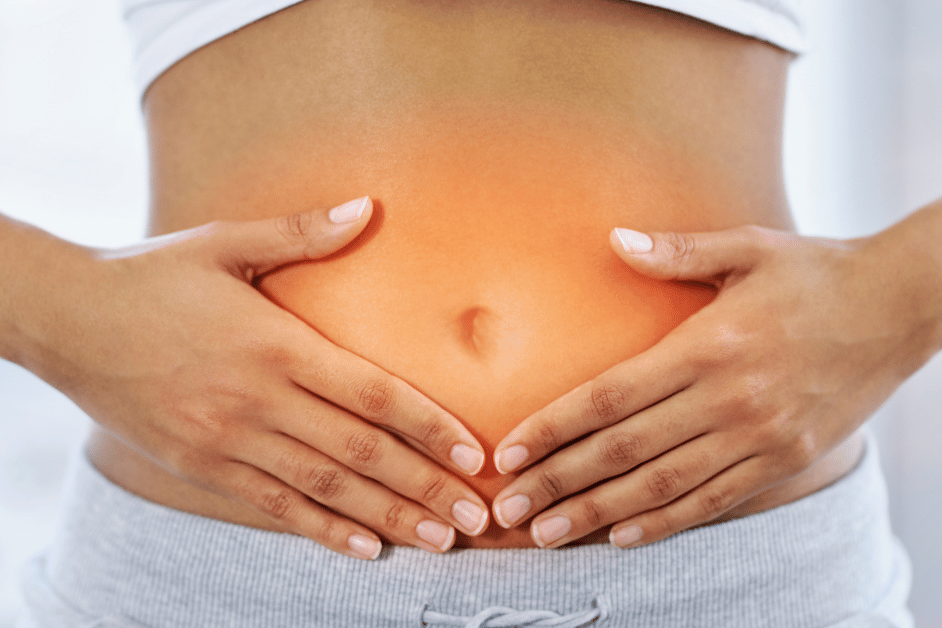Which of these best describes your sex drive?
“Want it, need it, gotta have it!”
“Could take it or leave it…” or
“Don’t even think about it!”
Whatever you answer, there’s no shame.
Women are pretty reluctant to say our libido (or lack thereof) is one of our top health concerns. But when I dig deep with the women I work one-on-one with in my clinic, I find that almost all of them are struggling with their sex drive.
And personally, when I was struggling with hormone imbalance, my sex drive was non-existent. I thought it was just “normal.” After all, as women we are conditioned to believe we should want sex less than men.
Truth: healthy women have robust sex drives!
Our libido isn’t just dictated by whether our partner brings home flowers or we’ve shaved our legs – it is controlled by a complex group of hormones and neurotransmitters. Too much or too little of one or another can cause our sex drive to dwindle away or get out of hand.
That means that if your libido is lacking, you don’t just need to try lighting candles or new lingerie (although if your sex drive is healthy, that would sound fun instead of like a chore!). Balancing your hormones can restore a healthy libido.
Today, I want to explain how your hormones impact your sex drive. I hope this information empowers you – and if you have more questions or need more support, please reach out to me!
What This Article Can’t Do
Before I dig in to all the juicy hormone info, there are a couple other things I want to get out in the open.
First, most of the research on hormones has been done based on cisgender, heterosexual people and in heterosexual relationships. More research on hormones in other populations is long overdue. If you’re outside this group, some of this information will apply to you and some of it won’t – but I’d love to support you in overcoming hormone issues one-on-one until more inclusive research is available.
Secondly – as you’re reading this I know symptoms of too much or too little of various hormones are going to jump out at you. But know this: the only way to diagnose hormone imbalances is with proper testing! That means blood, saliva, and/or urine testing.
Treatment for hormone imbalance is highly individualized, and I always recommend anyone who suspects hormone imbalance work one-on-one with a trained practitioner like myself for accurate testing and treatment! At the end of the article, I’ll share about my favorite hormone tests.
OK – disclaimers done – let’s get to the good stuff!
Estrogen – “The Feminine Hormone”
Estrogen is the hormone we associate with women. It makes women softer – both emotionally and physically. Estrogen is responsible for women’s curves: breasts, hips, and more fat on the butt! In studies of heterosexual men, women with higher estrogen levels were rated as more attractive.
It also increases a woman’s receptive sex drive—the part that makes her interested and open to penetration. Estrogen says “Take me now!” Women with higher estrogen levels may have more of a seductive sex drive – they are more likely to be receptive to sex, more likely to flirt and give “I’m available” signals, than they are likely to initiate it.
Testosterone – “The Masculine Hormone”
What hormone causes horniness? Testosterone is the hormone associated with men – but healthy women have testosterone, too. It helps us build muscle and causes us to feel more competitive and aggressive. In the bedroom, testosterone makes us want to initiate sex and governs the drive for genital sex and orgasms. Women with higher testosterone levels tend to have more of an aggressive sex drive and are more likely to initiate sex than wait for a partner to start things up. Interestingly, some post menopausal women have relatively higher testosterone levels (as compared to other hormones like estrogen) and may notice more of an interest in initiating at this phase in their lives.
Testosterone makes us less interested in relationships and commitment and more likely to want time alone (that’s what the Man Cave is for!). Women with higher testosterone levels tend to masturbate more, too. Too much testosterone can make us feel irritable – but too little can make us feel depressed.
Dopamine – “The Pleasure Chemical”
Dopamine isn’t exactly a hormone – it’s actually a neurotransmitter. Dopamine helps us anticipate pleasure – therefore having the drive and motivation to take action. It’s dopamine that makes us anticipate that sex = pleasure.
People who are low in dopamine tend to seem “flat” – they lack interest, enthusiasm, and get-up-and-go.
Testosterone increases the activity of dopamine in our brains, so supplementing with testosterone is often prescribed for women with low libido. But in my experience, this rarely works – or at least not without other support – probably because the issue isn’t just low testosterone, but also low dopamine. (Just another reason why you have to test!)
DHEA – “The Master Hormone”
DHEA is our most abundant circulating hormone. It’s produced both in the Adrenal glands and in the brain, and most of our other hormones are derived from it. DHEA levels peak in our 20s and start to decline from there – faster for some than others based on factors like your genetics and stress. Oral contraceptives are also know to lower DHEA levels.
Ideally, I like to see DHEA levels on the higher end of the normal range because DHEA can:
- Lower risk of depression
- Provide better function in old age
- Protect against immune suppression when cortisol levels are high (from stress)
- Prevent osteoporosis
- Maintain muscle mass
And of course, DHEA plays a major role in sex drive, orgasms, and sex appeal. Higher levels of DHEA in women correlated with higher rates of sexual desirability in studies. Most of our pheromones are derived from DHEA – scents that in the animal world dictate attraction and mating. Pheromones are often what make us feel an “instant connection” or drawn to someone. When a woman complains of low libido, I always test her DHEA levels first!
In times of stress, DHEA levels decrease significantly -and this can cause a cascade of low hormones throughout your body, since most other hormones are derived from DHEA.
Oxytocin – “The Love Molecule”
Oxytocin is a molecule that is triggered by physical touch. Oxytocin levels increase if you hug, hold hands, have sex, hold a baby – and even if you look at a dog! Levels of oxytocin also spike when you’re aroused and when you orgasm – it’s also what causes the uterus to contract during orgasm. If you’re in love, just thinking about the person can make your oxytocin levels go up.
Oxytocin helps you bond and feel love. It’s especially important for maternal bonding, and oxytocin levels rise during breastfeeding. Higher levels of oxytocin both reduce stress and rational thought – making it easier to “fall in love.”
Progesterone – “The Cock Blocker”
Does progesterone increase libido? In my practice I call progesterone the cock-blocking, (or clam-jamming) hormone. Basically, progesterone stops your sex drive. The effect of progesterone on your sex drive is so powerful, monks used to take the herb Vitex (aka Chaste Tree Berry!) to promote progesterone production and block their sex drive. Progesterone actually numbs the erogenous zones, meaning you’re likely to have dull orgasm with more stimulation – or no orgasm at all.
Many women have high levels of progesterone because they take hormonal contraceptives. The birth control pill contains a synthetic form of progesterone called progestin. Great birth control, right? Just kill your sex drive completely!
Progesterone isn’t all bad though – it promotes maternal behavior and has a mild sedative effect. It can make you feel calm, happy, and that everything is a-okay.
Does ovulation make you horny? In the second half of the menstrual cycle (after ovulation), progesterone is naturally higher. That makes sense biologically – once you’ve ovulated, your body won’t drive you to sex for reproductive reasons. When natural progesterone is balanced with estrogen, the dip in sex drive isn’t as strong and some women don’t notice it at all. Others might just be more interested in cuddling rather than going for an orgasm.
Prolactin – “The Nursing Hormone”
Prolactin is mostly associated with lactating women – it is the hormone that triggers your milk to let down after birth. Prolactin also tends to lower your sex drive – that’s why, in general, women have less sex when they are breastfeeding. Depending on your estrogen levels, you might retain some “receptive” sex drive even when prolactin is higher.
Promoting dopamine opposes prolactin. So if your prolactin levels are high and you’re NOT breastfeeding, using dopamine-promoting herbs can help lower prolactin and improve your sex drive. The only way to accurately gauge your prolactin levels is with testing!
Serotonin – “The Happy Chemical”
Serotonin is dopamine’s partner – together they are the two main neurotransmitters in the brain. Serotonin can impact your sex drive whether it’s too high or too low. Certain medications (like SSRIs) can cause high levels of serotonin. Dieting and chronically low calories can cause low serotonin, too.
Very high levels of serotonin dull your sex drive. That’s why SSRI antidepressants have lowered sex drive and delayed/weaker orgasms as a side effect.
Conversely, low levels of serotonin can magnify your sex drive. In people with depression, low serotonin levels can even lead to sex addiction. In women with low serotonin, orgasms happen faster and easier. Men with low serotonin ejaculate right away.
Your Menstrual Cycle – “The Conductor”
Your menstrual cycle is like the conductor of all these hormones and chemicals. As the cycle progresses, hormone levels naturally rise and fall, leading to a shift in your sex drive.
At the beginning of your cycle, all hormone levels are low. Mid-cycle, estrogen and testosterone both spike – leading to an increase in sex drive (you’ll be both more aggressive and receptive to sex).
Many women also notice their libido peaks right before they start their period, as progesterone is naturally falling relative to testosterone. Your genitals will be more sensitive and it’s easier to orgasm during progesterone withdrawal.
During menses, some women have an increased sex drive – again because progesterone is lower relative to testosterone. But because serotonin levels can also drop during this time you might be grouchy too. Grumpy and horny!
The natural shift in hormones throughout the month can explain why sometimes you want sex more for the cuddling, emotional bonding, and skin-to-skin contact, – and why other times you just want an orgasm without all the bells and whistles.
Your Hormones & Your Libido
Our sex drive is completely dependent on our hormones. And as you’ve learned in this article, it’s not as simple as “more testosterone makes you horny!” Balanced hormones are the key to a healthy sex drive.
If your sex drive isn’t how you’d like it to be – either too much or too little – looking at your hormone balance is a great place to start. I know you’re sick of hearing me say this by now, but the ONLY way to accurately diagnose hormone imbalance is with advanced testing. You never want to “guess and check” by starting treatments or supplements for what you “think” is the problem. This can cause even greater imbalances that take more time and work to resolve.
Over the years I’ve used blood and saliva hormone tests – but now I almost exclusively use the DUTCH hormone test. This test is a kit your practitioner orders and you complete at home. It uses dried urine (that’s what the D and U stand for in DUTCH) to accurately test various hormone levels. It’s more accurate than saliva testing, and much simpler than blood testing. You just pee on a stick, let it dry, and mail it back to the lab.
Once I know a patient’s hormone levels, we can work together to come up with a plan to balance them. I never share exact protocols publicly because I’ve never had 2 patients who needed the exact same treatment! Hormones really are that unique.
If this article has resonated with you and you think hormone imbalances could be at the root of your sex drive struggles, I hope you’ll book a free 20-minute exploration call with my team. There’s zero obligation, but we’ll dive deep into your issues and then share what we can do to help.
Having come out the other side of hormone imbalance, I can tell you – having my sex drive back is great! (And my husband loves it too.) I want the health and radiance that comes from balanced hormones for all women. Book a 20-minute call for free here!
At the Reverse-Age Method, we believe in a holistic approach to perimenopause and beyond, that addresses the root causes of your symptoms (like insomnia, hot flashes, night sweats, erratic periods, fatigue, skin aging, weight gain, and brain fog)– to also slow the pace that your cells are aging. Whether it’s improving gut health, optimizing detox function, enhancing mitochondrial function, or building muscle mass, our comprehensive program has got you covered.
If you’re new here, be sure to check out our Blog Page for more insights and tips on how to thrive during perimenopause. Our blog is packed with practical advice, success stories, and the latest research to help you on your journey.
For more updates and community support, follow us on social media:
You May Also Like...
Unlocking the Secrets of Hormonal Changes and Conquering Menopausal Weight Gain
Aisha, a client of mine, is an energetic and dynamic woman in the prime of her life. At 49 years young, she's a loving…
Insulin Sensitivity and Gut Health—A Dynamic Duo
Do you want your skin to look smooth and youthful for as long as possible? Do you want your brain to be sharp? What…
Whether you’re looking for help with your gut, your hormones, or both, our team of practitioners work together to treat the WHOLE you – guiding you to a healthier mind, body, and spirit day by day.



